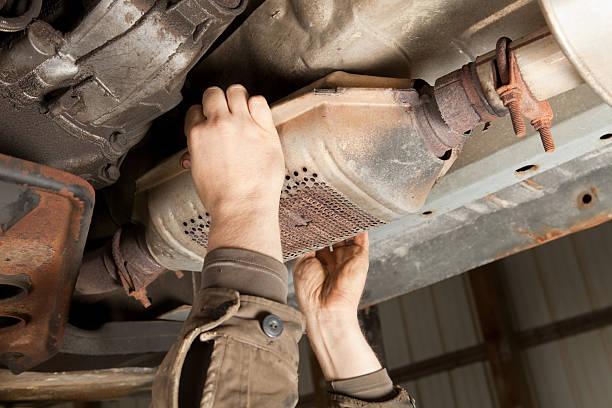Need for a Catalytic ConverterPosted by treadmark wheels and tyres on September 30th, 2019 The internal combustions of the engine of your car produce a lot of gases that are dumped out by it through the exhaust system. These gases, if not treated, can be hazardous and result in causing health issues. Catalytic Converter The gases produced as a residue of the internal combustions in the engine are known to be hydrocarbons, carbon monoxides and nitrogen oxides. The catalytic converter is responsible for converting these gases to safer levels before discharging them into the atmosphere. It converts and breaks down the gases to water vapour and less harmful gases by a series of chemical reactions and ensure that the environment stays clear of them. How does it work The catalytic converter is a device with a core of ceramics. It has several pores that measure less than 1mm. The pores are coated with different powdered catalysts that contain platinum, palladium and rhodium. When the gases pass through these pores, the heat from the engine helps in breaking them down their chemical structure and ensure that they are safe to be sent through the exhaust. The converted changes these gases to nitrogen and oxygen. Hydrocarbons and carbon monoxide are broken down to carbon dioxide and water. You might be told that it’s fine to remove the catalytic converter from your car. However, this is the most unwise thing you could do. The difference between the emission levels of a car with and without a catalytic converter is huge. One with the converter is much better for the environment. While they are known to have a good life, it is always good to get your catalytic converter checked every now and then. Issues related to Catalytic Converters A damaged converter is prone to increase the exhaust emissions of your car, while a decree in its performance levels can also be felt. The fluctuation of the temperature in the exhaust is responsible for this at times. The unburnt fuel and residue in the exhaust cause issues when it starts to heat up. It damages the converter pores and the fine catalyst material. This can render it useless and reduce the conversion rate of your engine’s gases. A damaged catalytic converter would not be able to break down the gases and, thus, increase the output of gases from the exhaust. Lambda Sensor and ECU The oxygen or lambda sensor is another device that is responsible for maintaining a check on the carbon emissions of the exhaust. It monitors the amount of oxygen present in the exhaust gases and conveys this information to the engine management system or engine control unit (ECU). The ECU then ensures that the optimum amount of air/fuel is being used and the cleanest and most efficient combustion is achieved. A failed catalytic converter is not only harmful to you but also those around you. A car with such a converter is sure to visit the gas station much more times as well. If you have any queries or need assistance with exhaust repair Uxbridge, contact us at M & C Tyres. Our experts are proficiently trained to, both, repair damages and provide wise pieces of advice to our customers. We assure you to take care of your car with the utmost care and guarantee to deliver quality results.
Read More : All Season Tyres: Things You Must Know Like it? Share it! |



